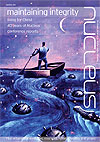It was a privilege and honour as ever, to be present amongst the gathering of about 400 medical students and CMF staff from across the UK and Europe. We met corporately to worship God and focus on being better equipped to serve him in our calling as Christian medics. The Hayes, Swanwick, Derbyshire, is a haven in which to be pleasantly fattened up on three course meals, and spoilt with double beds all to oneself, not mentioning all the spiritual nourishment and fellowship we could want.
The highlights for me included excellent and relevant seminars and great encouragement from the conference address. Another favourite conference attraction for me is when we gather exhausted and well fed on Friday night to cheer the largest medical school – with Manchester beaten to the first post by Southampton this year! I'm always thankful that I haven't travelled as far as some (Edinburgh and Tajikistan to name a couple!)
David Robertson gave Bible addresses based on 1 Peter. The first, 'Prepare Your Minds', reminded us that we have the inexpressible and glorious joy in God's purposes through suffering. In the second, 'Live as Free Saints', we remembered our identity as a royal priesthood; a chosen people of his own possession. Sunday afternoon's address, entitled 'They Think it Strange', encouraged us to arm ourselves with Christ's attitude, so that our faith may endure and be proved genuine. Above all, we were reminded to be clear-minded and self controlled so that we might pray. On a personal level, to be reminded that I am God's possession first and a medical professional second was a great encouragement to me.
Laurence Crutchlow's seminar on contraception and fertility encouraged us to think through the practicalities of our views in this field of medicine. Should Christians provide contraception to unmarried couples or even at all? When do we believe life begins and how does that determine which contraception we should use? It is ethical to prescribe contraception that we would not use ourselves? What about IVF? How does this fit with the call in Romans 15:5 to live in harmony with one another? It was a fantastic opportunity to reflect and be challenged about my own views on the origins and sanctity of life. It has helped facilitate discussion of the ethical implications of contraception amongst peers whilst on my Obstetrics and Gynaecology placement. An excellent resource on this topic is Matters of Life and Death by John Wyatt. (1)
In a poignant seminar lead by Trevor Stammers on 'Crash and Burn', a group discussion was facilitated on the role of faith in mental health problems, both in ourselves and in our patients. Depression is the second leading cause of morbidity currently in the UK and had been described as 'toothache of the soul' and 'freezing of the spirit'. But how does the knowledge of the 'inexpressible and glorious joy' of knowing him fit with feelings of hopelessness, worthlessness and poor self esteem that we feel during times of tiredness and isolation? A perfectionist focus on a perfect Saviour can exacerbate these feelings of nothingness. Man-made religion can make us feel guilty, as epitomised by the question 'should Christians even get depressed?'
It is easy to get bogged down and disheartened in clinical practice. It is important in life to remember God's astounding promise in Romans 8:28: for those who love God, God works for good in all things. It was wonderful to be encouraged by others at the seminar that true Christianity is liberation from guilt and shame, that God loves us and created us exactly how we are, and that Christ's perfect love for us is so complete as to cast out all fear. It was a great encouragement to look at passages such as Lamentations 3, Jonah 2 and Elijah in 1 Kings 19. I learnt that if depression is an issue that God felt was important enough for the prophets to deal with, how highly should we acknowledge and view it? A good book to read on this topic if you are struggling with understanding depression in believers is I'm Not Supposed To Feel Like This by Chris Williams. (2)
Other seminars this year were well geared towards their target audience. 'Medical Mission' both encouraged and gave practical advice and tips on how it is better to be preparing to go yet willing to stay, rather than being willing to go but preparing to stay. A seminar on Islam gave grounding in appropriately relating to Muslim friends and colleagues while maintaining the gentle challenge of a godly life to those of a different faith, and as in all our friendships. Euthanasia, assisted suicide, suffering and the F1 survival kit remain popular choices and raise issues of great importance and relevance to Christian healthcare professionals.
Finally, who could overlook the bargains to be found in the CMF bookstall? This year, I managed to buy from it without actually setting foot inside, a new record for me! It was also great to hear the challenges and praise points from our international brothers and sisters, the CMF opportunities to travel abroad on summer camps, attend summer schools, and for internships or Study Modules in the CMF office.
So when can I book for next year?
































